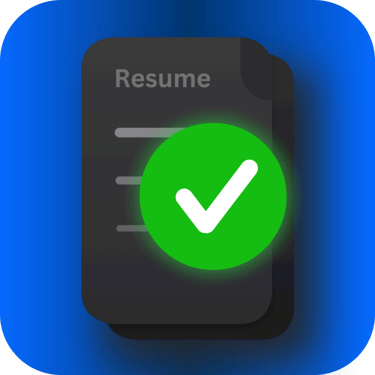How to Build a Powerful Resume With No Experience
6/25/20253 min read
Internships have a 70% chance of leading to a full-time job offer.
Remember the feeling of starting a new video game? Your character is at Level 1. Your inventory is empty. Your map is blank. You have all this potential, but you haven’t done anything yet to prove it. Writing your first real resume can feel exactly the same.
You look at job descriptions asking for "experience," and then you look at your own history—a collection of classes, a part-time summer job, maybe some club activities. It feels like you have an empty inventory. How are you supposed to defeat the first boss—the hiring manager—with nothing to fight with?
The secret is that your inventory isn't empty. You just haven't learned how to label your items yet. For an entry-level position, you’re not selling experience; you're selling potential. Here’s how to craft a resume that showcases it.
Step 1: Your objective is your "character mission"
For experienced professionals, a resume objective is outdated. For you, it's essential. This is where you state your mission. It should be sharp, ambitious, and customized to the company you're applying to.
Before (Generic):
Recent graduates seeking an entry-level position to start my career.After (Tailored for a junior analyst role):
A highly motivated and analytical recent graduate with a B.S. in Economics from State University. I am eager to apply my knowledge of statistical analysis and data modeling to support the data-driven decision-making at [Company Name].
This immediately shows you've done your research and you understand what they do.
Step 2: Your education section is your "work experience"
Move your education section to the very top of your resume, right below your objective. This is your most impressive qualification right now, so lead with it. But don't just list your degree. Treat it like a job.
Add relevant coursework: List 3-5 upper-level classes that directly relate to the job description.
Showcase academic projects: Describe a major project or paper. "Completed a semester-long project analyzing market trends, utilizing Excel pivot tables to present findings on consumer behavior."
Include your GPA: If it's a 3.5 or higher, add it. If not, leave it out.
Step 3: Reframe everything else as "relevant experience"
You might not have a "Professional Experience" section, but you absolutely have "Relevant Experience." This is where you list internships, volunteer positions, part-time jobs, and even leadership roles in clubs. The key is to translate these experiences into professional skills.
Your Part-Time Barista Job:
Instead of: "Made coffee."
Translate to: "Managed a high volume of customer orders in a fast-paced environment, honing skills in time management, client communication, and point-of-sale (POS) systems."
Your Role as Club Treasurer:
Instead of: "Handled club money."
Translate to: "Managed a $5,000 annual budget for the university debate club, responsible for all financial tracking, reporting, and procurement."
Step 4: Your skills section shows your eagerness to learn
This is where you list your technical skills. Be honest about your proficiency level. It’s okay to be a beginner.
Example:
Technical skills: Proficient in Microsoft Office Suite (Word, Excel, PowerPoint); Basic knowledge of Python and SQL (from coursework); Familiar with Canva.
The challenge: seeing the gold in your own story
When you're just starting out, it’s incredibly hard to see the value in what you've done. You're so focused on what you haven't done that you dismiss the skills you built scooping ice cream or the data analysis you did for a class project. It feels like you're trying to build a resume out of thin air.
Your personal experience translator
What if you had a tool that could look at your "empty" inventory and show you that it's actually full of valuable items? A tool that can help you translate "barista" into "client communication"?
That’s exactly what the TailorMyResume iOS app is for. It's designed to help entry-level candidates see and articulate their potential. Our app analyzes the job description for the key skills they want—even in an entry-level role—and helps you find examples of those skills in your academic and personal history. It takes the guesswork out of building your very first powerful resume.
Stop feeling like you have nothing to offer. You have everything you need to begin.
Ready to start your career with confidence? Download TailorMyResume from the App Store and build a resume that showcases your true potential.


